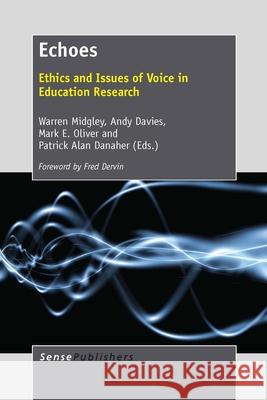Echoes : Ethics and Issues of Voice in Education Research » książka
Echoes : Ethics and Issues of Voice in Education Research
ISBN-13: 9789462094895 / Angielski / Miękka / 2014 / 260 str.
Echoes : Ethics and Issues of Voice in Education Research
ISBN-13: 9789462094895 / Angielski / Miękka / 2014 / 260 str.
(netto: 234,73 VAT: 5%)
Najniższa cena z 30 dni: 235,36
ok. 22 dni roboczych.
Darmowa dostawa!
Echoes: Ethics and Issues of Voice in Education breaks new ground in the field of education research ethics, by examining different perspectives on the role, influence and importance of voice. Drawing on a variety of philosophical and paradigmatic approaches, Echoes: Ethics and Issues of Voice in Education examines how and the different ways in which researchers conceptualise voice in the context of broader theoretical and methodological issues relating to research ethics. Written by authors working across the globe in a variety of academic contexts, it asks: How might voice in education be reconceptualised? What factors influence whether or not, and in what ways, voices are heard and/or (re)presented in education research? What implications do (re)conceptualisations of voice have with respect to the ethics of education research? What methods can be used to explore the role, importance and influence of voice in education research from an ethics perspective? How might voices be appropriately acknowledged and represented in education research? Echoes: Ethics and Issues of Voice in Education invites the reader to join the conversation, as it prompts reflection and discussion about the challenges and concerns inherent in the representation of voice in education research."
Echoes: Ethics and Issues of Voice in Education breaks new ground in the field of education research ethics, by examining different perspectives on the role, influence and importance of voice. Drawing on a variety of philosophical and paradigmatic approaches, Echoes: Ethics and Issues of Voice in Education examines how and the different ways in which researchers conceptualise voice in the context of broader theoretical and methodological issues relating to research ethics.Written by authors working across the globe in a variety of academic contexts, it asks: • How might voice in education be reconceptualised? • What factors influence whether or not, and in what ways, voices are heard and/or (re)presented in education research?• What implications do (re)conceptualisations of voice have with respect to the ethics of education research?• What methods can be used to explore the role, importance and influence of voice in education research from an ethics perspective?• How might voices be appropriately acknowledged and represented in education research?Echoes: Ethics and Issues of Voice in Education invites the reader to join the conversation, as it prompts reflection and discussion about the challenges and concerns inherent in the representation of voice in education research.











